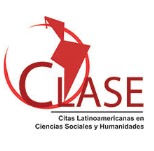Colaboração: perspectias da família e do terapeuta quanto a uma terapia útil
DOI:
https://doi.org/10.38034/nps.v27i60.379Palabras clave:
Gregory Bateson, epistemologia cibernética, estética, terapia sistêmica, intuição, identidade do terapeutaResumen
Este estudo qualitativo examinou como um grupo de famílias e seus terapeutas descreveram uma terapia útil. A análise qualitativa apresentou perspectivas da família e do terapeuta. Como uma dupla descrição, as perspectivas do terapeuta e da família valorizaram a conversação, participação e o relacionamento como as três áreas centrais de uma terapia útil. Estas estão especificadas por categorias e subcategorias que focam as atividades de compartilhamento de experiências, contribuição do próprio conhecimento e envolvimento pessoal, a formulação e reformulação de perguntas e o feedback correspondente. A discussão de similaridades e diferenças entre as perspectivas provê uma descrição do que constitui uma boa terapia para as famílias e terapeutas, apontando para a expansão de modelos que têm norteado os terapeutas.Descargas
Citas
Andersen, T. (1991). The reflecting team: Dialogues and dialogues about the dialogues. New York: Norton Press.
Andersen, T. (1993). See and hear, and be seen and heard. In S. Friedman (Ed.), The New Language of Change.Constructive Collaboration in Psychotherapy (pp. 303-322 ). New York: The Guilford Press.
Anderson, H. (1996). A reflection on client-professional collaboration. Families, Systems & Health, 14, 193-206.
Anderson, H. & Goolishian, H. A. (1988). Human systems as linguistic systems: Preliminary and evolving ideas about the implications for clinical theory. Family Process, 27, 371-393.
Anderson, H. & Gehart, D. (Eds.). (2007). Collaborative Therapy: Relationships and
conversations that make a difference. New York: Routledge.
Balmbra, S. (2006). User Guidelines for Family Dialogue Set. Recuperado de http://www.balmbra.no/Family%20Dialogue%20Set/eng/ fds%20eng.htm
Barkley, R. A. (1997). Defiant Children: A Clinician’s manual for assessment and parent training. New York: Guilford Press.
Bateson, G. (1980). Mind and nature: A necessary unity. Toronto: Paladin.
Bennett, L. (2008). Narrative methods and children: Theoretical explanations and practice issues. Journal of Child and Adolescent Psychiatric Nursing, 21(1), 13-23.
Claiborne, C. D., Goodyear, R. K., & Horner, P. A. (2002). Feedback. In J. C. Norcross
(Ed.), Psychotherapy relationships that work. Therapist contributions and responsiveness to patients. (pp. 217-233). New York: Oxford University Press.
Elliott, R., Fischer, C. T., & Rennie, D. L. (1999). Evolving guidelines for publication of qualitative research studies in psychology and related fields. British Journal of Clinical Psychology, 38, 215-229.
Flaskas, C. (2002). Family therapy beyond postmodernism: Practice challenges theory. New York: Brunner-Routledge.
Gehart-Brooks, D. R. & Lyle, R. R. (1999). Client and therapist perspectives of change in collaborative language systems: An interpretative ethnography. Journal of Systemic Therapies, 18(4), 58-77.
Gehart-Brooks, D. R., Ratliff, D. A., & Lyle, R. R. (2001). Qualitative research in family therapy: A substantive and methodological review. Journal of Marital and Family Therapy, 27(2), 261-274.
Gehart, D. R. & Lucas, B. M. (2007). Client advocacy in marriage and family therapy: A qualitative case study. Journal of Family Psychology, 18(1), 39-56.
Glaser, B. G. & Strauss, A. L. (1968). The discovery of grounded theory: Strategies for qualitative research. London: Weidenfeld and Nicholson.
Hill, C. E., Thompson, B. J., & Williams, E. N. (1997). A guide to conducting consensual qualitative research. The Counseling Psychologist, 25, 517–572.
Hill, C. E. & Knox, S. (2002). Self-disclosure. In J. C. Norcross (Ed.), Psychotherapy relationships that work: Therapist contributions and responsiveness to patients (pp. 255-265). New York: Oxford University Press.
Horvath A. O. & Bedi, R. P. (2002). The Alliance. In J. C. Norcross (Ed.), Psychotherapy relationships that work: Therapist contributions and responsiveness to patients (pp. 37-69). New York: Oxford University Press.
Kvale, S. (1996). Interviews: An introduction to qualitative research interviewing. Thousand Oaks, CA: Sage Publications.
Lambert, M. J., Bergin, A. E., & Garfield, S. L. (2004). Introduction and historical overview. In M. J. Lambert (Ed.), Bergin and Garfield’s handbook of psychotherapy and behavior Change (5th ed, pp. 3-15). New York: John Wiley and Sons, Inc.
Lambert, M. J. & Ogles, B. M. (2004). The efficacy and effectiveness of psychotherapy. In M. J. Lambert (Ed.), Bergin and Garfield’s handbook of psychotherapy and behavior Change (5th ed., pp. 139-193). New York: John Wiley and Sons, Inc.
London, S., Ruiz, G., & Gargollo, M. (1998). Clients’ voices: A collection of clients’ accounts. Journal of Systemic Therapies, 17(4), 61-71.
McGoldrick, M., Gerson, R., & Shellenberger, S. (1999). Genograms: Assessment and
intervention. New York: Norton Press.
McNamee, S. (2004). Promiscuity in the practice of family therapy. Journal of Family Therapy, 26(3), 224-244.
Miller, S. D. & Duncan, B. L. (2004). The outcome and session rating scales: Administration and scoring manual. Chicago: Institute for the Study of Therapeutic Change.
Nerdrum, P. & Rønnestad, M. H. (2002). The trainees’ perspective: A qualitative study of learning empathic communication in Norway. The Counseling Psychologist, 30, 609-629.
Norcross, J. C. (Ed.). (2002). Psychotherapy relationships that work. Therapist contributions and responsiveness to patients. New York: Oxford University Press.
O’Connor, T. S., Meakes, E., Pickering, M. R., & Schuman, M. (1997). On the right track: Client experience of narrative therapy. Contemporary Family Therapy, 19(4), 479-495.
O’Connor, T. S., Davis, A., Meakes, E., Pickering, M. R., & Schuman, M. (2004). Narrative therapy using a reflecting team: An ethnographic study of therapists’ experiences. Contemporary Family Therapy, 26(1), 23-39.
Palazzoli, M. S. (1978). Paradox and counter paradox. New York: Jason Aronson.
Pinsof, W. M. & Wynne, L. C. (2000). Toward progress research: Closing the gap between family therapy practice and research. Journal of Marital and Family Therapy, 26(1), 1-8.
Rennie, D. L., Phillips, J. R., & Quartaro, G. K. (1988). Grounded theory: A promising approach to conceptualization in psychology. Canadian Psychology/Psychologie Canadienne, 29(2), 139-150.
Rennie, D. L. (1992). Qualitative analysis of the client’s experience of psychotherapy: The unfolding of reflexivity. In S. G. Toukmanian & D. L. Rennie (Eds.), Psychotherapy Process research: Paradigmatic and narrative approaches (pp. 211-233). Newbury Park, CA: Sage Publications.
Rennie, D. L. (2000). Grounded theory methodology as methodical hermeneutics. Theory & Psychology, 10, 481-502.
Schutz, A. (1967). The phenomenology of the social world. Evanston, IL: Northwestern University Press.
Sells, S. P., Smith, T. E., Coe, M. J., Yoshioka, M., & Robbins, J. (1994). An ethnography of couple and therapist experiences in reflecting team practice. Journal of Marital and Family Therapy, 20(3), 247-266.
Smith, T. E., Sells, S. P., & Clevenger, T. (1994). Ethnographic content analysis of couple and therapist perceptions in a reflecting team setting. Journal of Marital and Family Therapy, 20(3), 267-286.
Seikkula. J. & Arnkil, T.E. (2006). Dialogical Meetings in Social Networks. London:
Karnac.
Smith, T. E., Winton, M., & Yoshioka, M. (1992). A qualitative understanding of reflecting teams II: Therapists’ perspectives. Contemporary Family Therapy, 14(5), 419-432.
Smith, T. E., Yoshioka, M., & Winton, M. (1993). A qualitative understanding of reflecting teams I: Client perspectives. Journal of Systemic Therapies, 12(3), 28-43.
Stern, D. N. (1985). The Interpersonal World of the Infant: A View from Psychoanalysis and Developmental Psychology. New York: Basic Books.
White, M. (2007). Maps of narrative practice. New York: W.W. Norton & Company.
Descargas
Publicado
Cómo citar
Número
Sección
Licencia
Autores que publicam nesta revista concordam com os seguintes termos:- Autores mantém os direitos autorais e concedem à revista o direito de primeira publicação, com o trabalho licenciado simultaneamente sob uma Licença Creative Commons Attribution após a publicação, permitindo o compartilhamento do trabalho com reconhecimento da autoria do trabalho e publicação inicial nesta revista.
- Autores têm autorização para assumir contratos adicionais separadamente, para distribuição não-exclusiva da versão do trabalho publicada nesta revista (ex.: publicar em repositório institucional ou como capítulo de livro), com reconhecimento de autoria e publicação inicial nesta revista.
- Autores têm permissão e são estimulados a publicar e distribuir seu trabalho online (ex.: em repositórios institucionais ou na sua página pessoal) a qualquer ponto antes ou durante o processo editorial, já que isso pode gerar alterações produtivas, bem como aumentar o impacto e a citação do trabalho publicado (Veja O Efeito do Acesso Livre).

















